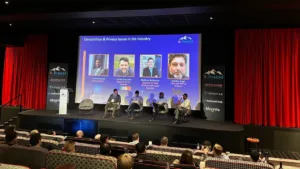By Andrew Stephenson, Director of Marketing EMEA & India at Treasure Data
From a platform of humble beginnings to a digital advertising behemoth, Facebook has made a seismic impact on the marketing industry in a multitude of ways. Once a network to keep in contact with friends, to now a big tech giant – the goldmine of customer data it has built over the past 20 years makes it a great force for marketers and consumers alike.
Regardless of whether or not the platform has lost its ‘cool’ for younger generations, it continues to garner over three billion monthly active users and leaves a huge footprint on our ever-evolving digital landscape. In the process, it has rewritten the rules of building and maintaining connections with customers, a number one priority for digital marketers. But as consumer expectations grow in leaps and bounds, this becomes a harder feat.
Facebook’s ability to stay agile in response to user behaviour is a crucial reminder for marketers to reimagine how they engage with their consumers as they navigate their ever-evolving demands.
But where do they start? Here are three things marketers should consider.
Trust isn’t just given – it’s earned
It’s a tale as old as time – consumer trust is hard to win and easily lost. Consumer’s expectations have skyrocketed in all aspects, from wanting a tailored online shopping experience, all the way to how they expect their data to be safeguarded.
Over the years we have witnessed tighter regulations on data, the eradication of cookies currently in our midst, and even Facebook’s own run-in with the law over privacy and data mishandling. The current landscape marks a fraught situation for marketers needing to shore up consumer data, especially when consumers often feel they don’t see the value of what they get in return.
In fact, our research at Treasure Data found that half (50%) of UK consumers would prefer to remain anonymous to brands, with 48% admitting to deliberately withholding their personal data from them. But marketers shouldn’t feel disheartened, as 47% of consumers would be willing to share their data if it resulted in a more personalised service.
So, it’s clear that consumers need to be viewed as partners in this process if brands are to build a trusted relationship with them. Marketers now have the task of communicating the value consumers see in return for sharing their data and ensuring it’s properly safeguarded once they have it.
The thin line between engaging and annoying consumers
As the digital landscape expands at a dizzying pace, so has the massive amount of communications brands can – and do – instantly share with consumers.
But the truth is, many brands are falling short of ensuring their communications are relevant to consumers’ wants and needs. Our research found that while 62% of consumers hear from brands digitally six or more times per day, a massive 88% say half or less of the content is relevant – illustrating the uphill battle marketers currently face.
It’s no secret that irrelevant ads can irritate and deter consumers from engaging with brands further. And after successfully winning their trust, marketers need to deliver and engage their consumers with precision. It’s crucial they make use of all data sources available to them in order to build a 360° profile of their consumer, and ensure the right message reaches the right audience at the right time.
It’s brands who are able to bring customers along on the journey that will thrive in this digital landscape, with those who fail to do so risking their customers changing their relationship status from BFF to foe.
The need for a new approach
Marketers for years have relied upon a combination of traits like consumers’ gender, location or age to provide clues on their interests, desires – and ultimately – shopping behaviour. But how accurate are these methods when applied to a modern-day consumer?
Whilst 96% of marketers use customer segmentations, a staggering three quarters (73%) argue it’s hard to group consumers into one segment because they are always evolving. Indeed, over six in ten (62%) agree the idea of fixed consumer categories is no longer fit for marketing purposes altogether.
Marketers need to overhaul their approach to segments and consider strategies that help capture consumers’ momentary mindsets in real time. Only by understanding the exact mindset individuals are in at any given time can brands provide a truly personal approach and build a lasting relationship with their customers.
There is no data without trust, and without data marketers lack the robust foundation upon which to communicate and engage their customers. Marketers need to reimagine consumers as partners in the customer journey – as without these insights, the consequences may be detrimental.
In the same way Facebook has stayed relevant by understanding their users’ desires, brands seeking longevity must stay nimble and abreast of consumers’ ever-changing demands in order to supercharge their growth for the years to come.









